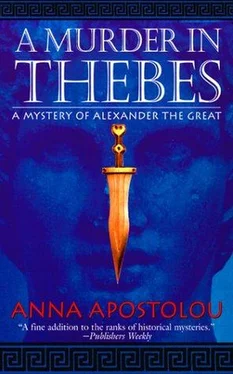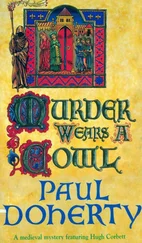Paul Doherty - A Murder in Thebes
Здесь есть возможность читать онлайн «Paul Doherty - A Murder in Thebes» весь текст электронной книги совершенно бесплатно (целиком полную версию без сокращений). В некоторых случаях можно слушать аудио, скачать через торрент в формате fb2 и присутствует краткое содержание. Год выпуска: 2013, ISBN: 2013, Издательство: Headline, Жанр: Исторический детектив, на английском языке. Описание произведения, (предисловие) а так же отзывы посетителей доступны на портале библиотеки ЛибКат.
- Название:A Murder in Thebes
- Автор:
- Издательство:Headline
- Жанр:
- Год:2013
- ISBN:9780755395736
- Рейтинг книги:4 / 5. Голосов: 1
-
Избранное:Добавить в избранное
- Отзывы:
-
Ваша оценка:
- 80
- 1
- 2
- 3
- 4
- 5
A Murder in Thebes: краткое содержание, описание и аннотация
Предлагаем к чтению аннотацию, описание, краткое содержание или предисловие (зависит от того, что написал сам автор книги «A Murder in Thebes»). Если вы не нашли необходимую информацию о книге — напишите в комментариях, мы постараемся отыскать её.
A Murder in Thebes — читать онлайн бесплатно полную книгу (весь текст) целиком
Ниже представлен текст книги, разбитый по страницам. Система сохранения места последней прочитанной страницы, позволяет с удобством читать онлайн бесплатно книгу «A Murder in Thebes», без необходимости каждый раз заново искать на чём Вы остановились. Поставьте закладку, и сможете в любой момент перейти на страницу, на которой закончили чтение.
Интервал:
Закладка:
Then Jocasta picked up her cloak and wrapped it around herself. She returned the oiled wig to her shaven head, hung the sacred pectoral around her neck, and slipped her feet into her sandals. She sat on the edge of her bed and fastened the thongs.
“You stay here,” she ordered. “Do not tell your sisters! If the god calls, I must respond.” Jocasta blew out the oil lamp and, leaving Antigone standing in the darkness, hurried down the stairs, out through the back entrance, and across the small courtyard. She was about to undo the wicket gate but stopped at the voice, which sounded hollow, sepulchral.
“Come no further!”
“Who are you?” Jocasta whispered into the darkness. She could see nothing. She caught the smell of goatskin.
“Come no further!” the voice ordered, “until I tell you to!” Jocasta was trembling with excitement.
“Who are you?” she urged, “please.”
“I am Oedipus, King of Thebes! Beloved of the gods! I have come to my city and it is wasted. In the shrine my Crown awaits!”
“Will you take it?” Jocasta asked.
“It is mine by right,” the voice replied, “and not the plaything of a Macedonian prince. Come with me, Jocasta!”
She opened the wicket gate but stopped. The pool of light only stretched a little way; beyond, the olive grove was dark. Jocasta felt the cold night wind cool the sweat on her brow and neck.
Was this trickery?
“Come!” the voice ordered.
Jocasta stepped into the darkness. “I can’t see you,” she stammered. A warm hand caught hers and gently pulled her closer.
“Do not be afraid, Mother. We must be gone.”
And Jocasta, thrilling at the voice of her god, followed his dark shape into the trees.
A few hours later the beggar known as Paemon came out of his hiding place among the pile of rocks in the olive grove and walked toward the shrine. Paemon was used to begging in front of the temples of Thebes but all of these were gone. When the city had been stormed, Paemon, who knew the streets and alleyways of Thebes, had fled like the wind. He had escaped the fury of the Macedonian phalanx, the wholesale plunder and looting that had taken place. Indeed, Paemon himself had indulged in some petty pilfering: a cup, some coins, some food. He had sheltered in the groves around the priestesses’ house and had come out to sell his ill-gotten gains to the soldiers who guarded the shrine. They had been kindly enough, giving him coins, scraps of food, bread, cheese, and wine.
Now Paemon felt agitated. He had been roused from his wine-sodden sleep by two people moving through the grove. He watched them go and then he heard what sounded like sobbing, groaning, but he dared not leave his hiding place.
Now, curiosity had gotten the better of him; Paemon trotted like a dog. His bare foot caught on something and he stumbled. Falling headlong he scrambled about. The old woman’s body lay there, her gown torn; the oiled wig had slipped off, revealing the wound, a savage blow that had cracked her skull like an egg. Paemon felt the corpse, cold and stiffening. Those old eyes stared out as if her soul had not gone to Hades but still lurked in the crumbling flesh. Despite the poor light Paemon caught their look of terror.
He peered around. What monstrosity now walked this grove? He looked at his hands. They were sticky with blood. Paemon got to his feet and ran to a nearby spring to wash himself. What could he do? Where could he go? What happened if the soldiers came? Would they arrest him? Would they put him on a cross to hang and writhe for days? The soldiers? Paemon’s tired mind raced. He was innocent. The gods knew he was innocent! The full horror of what had happened dawned on him. The old woman was a priestess. Whoever had killed her was guilty of sacrilege and blasphemy!
Paemon stared up at the lightening sky. The Furies would come, sent by almighty Zeus to pursue the killer to the ends of the earth. Paemon found that he couldn’t stop his teeth from chattering; his sore gums flared in pain. He scratched his crotch. Soldiers, men in armor would throw him about, joking and laughing, before they crucified him. But what about the soldiers in the temples? The captain of the guard was a kind fellow. He’d go there, tell him what he had seen.
Paemon ran, blundering out of the grove and onto the white track. Dawn was now breaking. He ran head down, and so he noticed them: small red blotches. He crouched down, touching one with his fingers. More blood. Paemon’s heart thudded. He heard a sound and turned. The specter standing behind him seemed to have come out of the earth, from the dark halls of Hades. A cloth mask covered his face, around the eyes was a bloody bandage. Some wild animal skin covered his head and draped his body. Was it a goat? A lion? The specter just stood there. Paemon backed away; the specter did not follow, but he brought one hand up. Paemon watched the club, knotted and gnarled. The ghastly figure then held up his other hand, clutching the Iron Crown. The ruby in the center gleaming like a fresh spot of blood in the morning light.
“Tell them all!” a voice grated. “Tell them that Oedipus has come to Thebes and taken his Crown!”
Paemon turned and fled. He didn’t care now. He must reach the soldiers. He tried to scream but his mouth was dry. He found himself at the foot of the steps. He wiped the sweat from his face and stared round. Something was wrong. The four soldiers lay there, sprawling in pools of blood that was seeping out of the hideous wounds to their heads. Paemon climbed the steps and stared in horror.
“You are dead!” he murmured, “all of you are dead!” He banged on the doors. No answer. He saw the corpse of the young officer and went over to it. The key still hung on his belt. Paemon went to touch it, but, no, he’d seen enough! And, turning, he fled like the wind toward the Macedonian camp.
Miriam was roused by Simeon shaking her shoulder.
“Get up!” he hissed. “Miriam, something dreadful has happened!”
She threw back the rough horse blankets and dressed hurriedly, slipping on sandals, wrapping a cloak around her, pulling up the hood. She splashed water on her face, grabbed an ash cane and followed her brother out of the tent. Alexander was there. Perdiccas was beside him-he was captain of the guard for that day. He grasped a tattered beggar man by the shoulder. The fellow looked as if he were about to swoon with fear; his lined face was red and sweat-soaked. His straggly mustache and beard were drenched with perspiration.
Alexander talked to him soothingly, stroking his hair. Perdiccas released his grip. Alexander took a golden daric out of his purse and held it before the man’s eyes. The man took it, his lips moving wordlessly.
“What are you saying?” Alexander asked.
“Your majesty, your worthiness, some wine and cheese.”
Alexander, though his face looked severe, smiled and nodded at Simeon who went back into the tent, bringing out a wineskin and some cheese in a linen cloth. The man ate these, gnawing at the cheese and drenching his mouth in spurts from the wineskin.
“There,” Alexander took the wineskin from him, “we need you sober.”
A figure loomed out of the morning mist: Olympias, garbed as if she were about to enter Athens in triumph, her hair dressed and pinned with a silver jeweled crown. Her red cloak was of pure wool with a gold fringe, though in her haste, she’d pulled on a pair of army boots.
“I’ve heard the news,” she snapped. “Alexander, what has happened?”
“I don’t know, Mother. But now we are assembled, we’ll all find out.”
Miriam rubbed her face. She wanted to ask questions but she knew Alexander. He hated to waste time in useless banter. Through the morning mist came the clink of armor.
Читать дальшеИнтервал:
Закладка:
Похожие книги на «A Murder in Thebes»
Представляем Вашему вниманию похожие книги на «A Murder in Thebes» списком для выбора. Мы отобрали схожую по названию и смыслу литературу в надежде предоставить читателям больше вариантов отыскать новые, интересные, ещё непрочитанные произведения.
Обсуждение, отзывы о книге «A Murder in Thebes» и просто собственные мнения читателей. Оставьте ваши комментарии, напишите, что Вы думаете о произведении, его смысле или главных героях. Укажите что конкретно понравилось, а что нет, и почему Вы так считаете.












